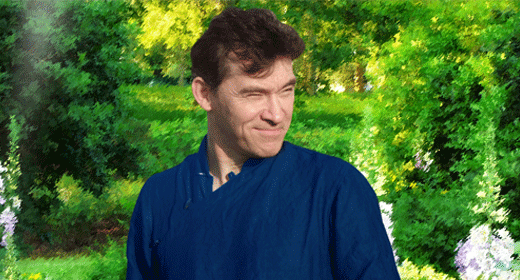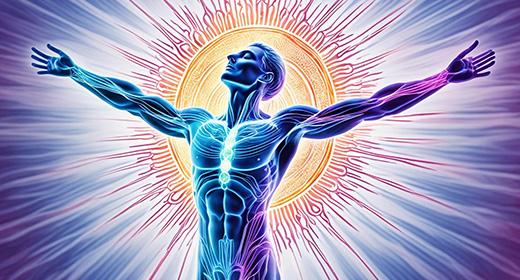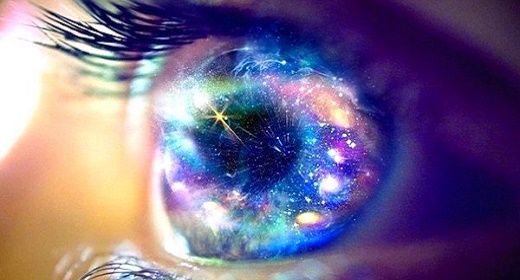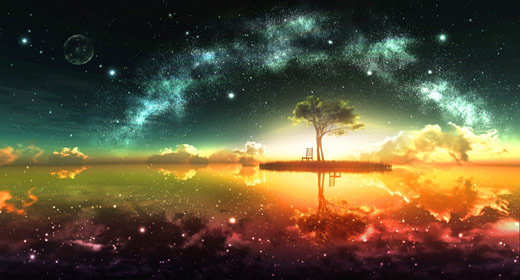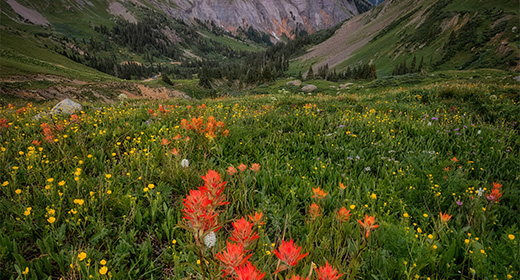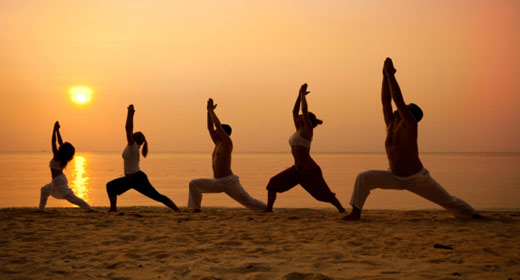by Virginia Lee: An Interview with Margot Anand: VL: How did you discover tantra?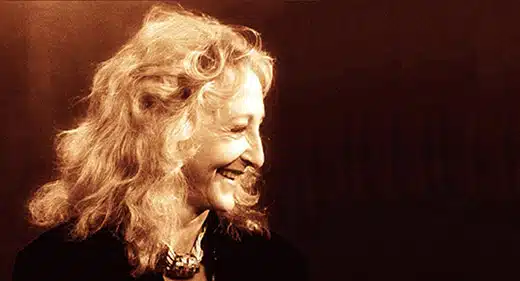 Margot Anand: The first time I made love, I discovered tantra. Although I had never heard the word “tantra” and didn’t know what tantra was, in fact what I had was a tantric experience. In other words, it was an experience of consciousness expansion beyond the body, beyond the mind and beyond time so that I connected with the truth of who I truly am, that which existed before I was born and will continue to exist after I die. I am referring to the eternal Self.
Margot Anand: The first time I made love, I discovered tantra. Although I had never heard the word “tantra” and didn’t know what tantra was, in fact what I had was a tantric experience. In other words, it was an experience of consciousness expansion beyond the body, beyond the mind and beyond time so that I connected with the truth of who I truly am, that which existed before I was born and will continue to exist after I die. I am referring to the eternal Self.
I was thrown into an experience which was not even an experience anymore.It was the truth of my being. I realized the light of spirit and I knew that sexuality was going to be my path of awakening as a woman. That was my revelation the very first time I made love. That’s what put me on my path. After I finished my studies in psychology, philosophy and history of art at the Sorbonne in Paris, I went on to research sacred sexuality around the world for seven years. I completed my master’s degree and now am finishing my Ph.D. through International Studies at the University of Hawaii.
VL: Who has been your most powerful teacher?
MA: I probably would say Osho (aka Rajneesh), although I had many others. Looking back, the one who was the most powerful was Osho. It started when I had finished my psychology studies at the Sorbonne and was very dissatisfied with how psychology was being taught in France. It was caught up in statistical analysis of behavior and I felt like I wasn’t getting anywhere interesting.
Then in the early ’70s, I went to an institute in England called Quae-sitor (which means the “inquirer”), the first institute to bring “New Age” teachers (from places like Esalen) to Europe. Then the leader of this institute came dressed in an orange robe and told extraordinary stories about meeting a master in India (who was Osho) who said, “I was expecting you. I want you to take your students to a new level which will require a week of preparation including encounter exercises, bioenergetics, massage and breathing.” After that, we became part of a sensory deprivation experiment. Each of us stayed alone in a hotel room by the sea. Our eyes were blindfolded, our ears plugged, and we had one bottle of water a day and a pound of grapes. This lasted for seven days and seven nights, the idea being for us to go deeper into our consciousness.
During this retreat, I had just read John Lilly’s Center of the Cyclone, and I expected to have an experience of meeting my guides, similar to what he described. Then as I went deeper I realized that was his experience — and that my experience was different. So I went through layers and layers and layers, until I came to this emptiness, this center of my being where there was nobody. And I had darshan with myself. I heard all the wise answers come of themselves to all the questions of my life. At that moment, a face appeared. And that face said to me: “Ecstasy is already within you. You do not have to look for it outside.” Considering the state of mind I was in, this was a huge message. I realized that I had been searching outside of myself for the teachers, the methods and the cultures, yet it was all already there. I knew that everything I was seeking was within.
The vision of this face I saw was Osho. It was the first time I had ever heard anything about him in my life. And he appeared to me that way. It took five years (including a marriage) before I ended up visiting him. When it finally happened, it was a very powerful meeting. Shortly thereafter, Osho asked me to lead the tantra groups at the ashram for the first time. When he offered me the job I said, “I don’t know how to lead tantra groups,” since I had only been trained as a Western therapist. Then he touched my forehead and wiped out my brain of any knowledge about methods, techniques and procedures. It all went away – a blank slate. Then he laughed and said, “You don’t have to worry. Just let me lead the tantra group through you.” And I said, “I don’t know what that means, but I’ll go for it.”
And that’s how I began teaching tantra. Now I’ve gotten to the point with my teaching that I am my own master, but he’s someone I still love. He’s around.
VL: How do you define tantra?
MA: I would say that tantra is the art of choosing with awareness what brings you joy, so that it opens the door to your spirit. That’s one definition. Another is that tantra is the art of weaving the contradictory aspects of your personality into one whole for the purpose of expanding your consciousness.
Let’s say you’re on a date. Maybe your heart says, “Yes, I want to open up. This is the one.” But your mind says, “Absolutely not, remember what happened last time.” And then your body says, “I’m turned on. I want sex.” All the different aspects of yourself are in contradiction to one another. You’re not in harmony, you’re in pain. So the tantric work I teach on the chakras harmonizes your energy and your consciousness into one entity. It’s the marriage between shakti (pure energy) and shiva (pure consciousness). When they marry, the world is born. That’s the cosmology of tantra. The goddess Shakti, embodying the feminine, and the god Shiva, embodying the masculine, are the two aspects of the divine. When they are joined as one in their fusion, the cosmos is born. From the tantric perspective, the cosmos is born out of an erotic union between the male and the female, which is a much more juicy perspective than the one that tells us to honor the prophet who was nailed on the cross to redeem our sins. That’s spirituality based on pain and punishment.
VL: What is the greatest misconception about tantra?
MA: There is a big misunderstanding in this country about tantra. Unfortunately, tantra has gotten a very bad reputation and is often thought of as a bastardized, semi-mystical sexual ther-apy. Some people seem to think if they can manage to have a one-hour orgasm, they can claim to be enlightened. Everybody who has been repressed by this puritanical culture becomes obsessed with the senses and the garden of pleasure, and all of a sudden, sexual prostitutes are called dakinis. The original meaning of the word “dakini” is the female Buddha, the enlightened woman. It saddens my heart to see how low we have gone. As one of the original teachers of tantra in this country, I see that most people don’t really know what it is all about.
In this country, it is hard to talk about sex and maintain any dignity. Sex is often perceived as something hidden, dirty and forbidden. Although that’s exactly what makes it so interesting, it’s what brings so much violence into it. It is as if you have to fight through all the cultural taboos to have a good time. That’s where I come in, to recondition people’s bodies, hearts and minds to understand that’s not the right approach. And I’m quite successful at it. I understand tantra to be a door to enlightenment. It is a spiritual path like yoga or zen. The only thing that makes it different from other spiritual paths is that sex doesn’t have to be left out of the picture. Sex is a skillful means, among others, that we use to awaken. There is no more challenging meditation than the sexual meditation, because in the sexual meditation, everything comes up: your timidity, your self-doubt, your lack of self-esteem, your lack of trust, all your past experiences that condition you to fear love.
But it’s really no different than any other meditation. If you can approach the sexual experience with the same quality of emptiness that you approach a zazen sitting, then you have understood everything. It doesn’t matter if you’re having sex, eating food, having a conversation or taking a walk. It is the state of your consciousness that matters, your understanding of who you truly are and who is behind the person engaged in the action. If you ask this question, then you come to emptiness, because there is nobody there — just pure consciousness. And consciousness cannot be upset, changed or swayed. It just is. It is all and everything. Once you know that, you can experience anything in life.
VL: Are all tantra teachings the same? If not, then how are they different?
MA: All tantra teachings are not the same. People don’t know that in the ancient tantra sutras of the enlightened masters, it is said that he who is empowered to be the guru (the teacher) is someone who has received direct transmission form an enlightened master. If one has been deemed ready to pass on the work, they are part of a protected lineage. That protection allows the tea-cher to tread where nobody else can tread, into very difficult and dangerous zones.
In tantra, working with sexual energy is not an easy path. One has to know how to confront the demons of our society in order to transform them into allies. The people I see come to me because they don’t know how to do it. This requires a lot of discrimination and power that doesn’t come from your ego. It’s something that comes from the master who empowered you to do that. In my case, there were three masters: Osho, Swami Satchidananda and a Sufi master named Siddhi Mohammed, the custodian of the Mosque of the Sacred Rock in Jerusalem.
VL: What should a student of tantra look for in a teacher?
MA: Once you have determined the source of their empowerment, the next step is to examine what they have written. Ask if their work has made a con-tribution within the context of the tantra culture and see if they have made a difference. Then look at the fruits of their work. Look at their students to see how they speak, how they live, how their lives have been transformed. These are the three criteria to consider when choosing a tantra teacher, especially if you are looking for the deeper, more mystical path. Practicing tantra is like diving for pearls. If you don’t go very deep, you won’t find them. You’ll just play around on the surface.
VL: So tantra is about more than sex?
MA: I will tell you what it is for me. The first level is to heal your sexuality. The second level is to expand the orgasmic power of your whole body. The third is to open the flow of energy that links the chakras to one another; it moves from the root chakra in the perineum to the crown chakra in the top of the head. Then shakti can move through you and marry with shiva. Once you have done these three things, the fourth level is to transform lust into bliss.
VL: Why do so many spiritual paths require celibacy?
MA: They consider that when sex is practiced with unawareness, it is a distraction. But I want to remind you that of the Buddha’s five mindfulness teachings, the third one was “sexual mindfulness.” What he was talking about (and something I have incorporated into my teaching) is that the place where we are most challenged and least aware, is the arousal of our lust.
When we instinctually want someone, we forget our promises and commitments. We forget everything. This is how empires have been lost. But it is the moment when awareness is most needed. Your capacity to be the witness, as you develop it in meditation, is to be thoroughly involved in the moment yet at the same time know it is a dream. That is when sexual mindfulness is called for, and that’s where people lose it. To put sexuality away is a shortcut as far as meditation is concerned because you don’t have to deal with all the ups and downs, the temptations and distractions. Ultimately, everyone chooses their own path. No one method is better than the other.
VL: What is the difference between yoga and tantra?
MA: As I understand it, yoga is a science that helps us to unite the body and mind for the purpose of knowing the divine. I have heard it said in India that the difference between tantra and yoga, is that according to traditional yoga philosophy, you had to renounce all worldly desires in order to know Brahma. In yoga, you control and purify yourself in order to realize enlightenment, but the tantric perspective says that you are already divine exactly as you are. Tantra tells you to completely let go and dive deeply into your nature as it is. In so many ways, yoga, tantra and meditation all go hand in hand. Tantra really is the yoga of love.
VL: Why is the spiritual element in sex so important?
MA: Orgasm is what brings us the closest to the experience of the divine. In the moment of orgasm, there is a bonding between the right side of our brain, which is the artistic and feeling side, and the left side, which is the center of thinking and logic. When intuition and intelligence fuse into one zero point of total connection, the ego disappears, time disappears and you become one with energy and consciousness. Even the enlightened Vedic masters of 5,000 years ago discovered meditation through exploring orgasmic states in sex. There’s a close connection between advanced meditation and a good orgasm.
VL: What do you mean by “high sex”?
MA: High sex for me is simply a method to get high naturally. Sex is a practice that releases endorphins, that expands our brain and releases natural opiates that can relieve pain in the body. I’ve discovered that if you have one long orgasm a day, your whole life will change — your creativity, your career, your magnetism, your ability to handle crises, your finances. Sex is the shortest and best way to access your naturally high state of being.
VL: How is high sex different from ordinary sex?
MA: Most people think that sex is a natural impulse, so why interfere with it? In fact, what we bring into the bedroom is mother, father, aunt, uncle, grandmother and grandfather — a whole crowd is in bed with us. Everybody has a particular opinion about how it should go, whether it’s right, whether it’s safe to open up, whether it’s honorable or not, etcetera.
Ordinary sex is usually a matter of instinctual impulse, a reflex response. It is conditioned not only by our family values, but also by what we learned in school and by what our culture teaches us. Very often, that conditioning gets in the way of our ability to be totally na-tural and allow our real responses to emerge. As a result, ordinary sex is rather limited. High sex allows us to move into sex with full awareness, responding moment to moment with the rising energy, being in the present without dragging in the past or projecting on the future. I am as present in high sex as when I sit on the zen pillow.
High sex also means seeing the divine in your partner and your partner seeing the divine in you, the very same consciousness that is namasté in yoga. If you can approach sex in that way, miracles take place.
VL: Is there a right way and a wrong way to make love?
MA: Yes. Usually the wrong way happens because physiologically speaking, there is a different psychology and timing in the way the body responds in the woman compared to the man. When the man is excited or stimulated, when he sees the beauty of a certain type of woman, his penis responds automatically. It is a brain/sex reflex that he has very little control over, and it’s something that happens within a few seconds to a few minutes. Once he is inside the woman, then he can relax and that’s when he opens his heart. This may take all of ten minutes. The erect penis just wants to be in the garden.
However, the woman is very different. Where the man starts with sex and moves to the heart, the woman starts from the heart. She needs a lot more time. She needs to feel safe and pro-tected. She needs to be touched in her heart and held as a little girl so that she can relax and trust the man. When all of that is given, then something relaxes in her, her juices flow, her sex opens and she is ready. All this takes about half an hour at least, so he is ready way before she is.
Confusion arises if she just lets him have his way without telling him what she needs, and he ends up landing before she has time to take off. Maybe she doesn’t really have an orgasm and she’s frustrated. Maybe she doesn’t even talk about it, and expresses her feeling toward him as anger. The whole situation can escalate because there hasn’t been honest communication about what each partner needs.
That’s why I say in my workshops that truth is erotic. When you tell the truth you take a risk, but at least you put yourself on the same page. If love is there and you’re willing to grow together, you can explore beyond your imits. So the wrong way is to have sex is without awareness and communication. The right way is to have sex the tantra way in a sacred space, which is explained thoroughly in my first book, The Art of Sexual Ecstasy.
VL: What is the role of seduction in high sex?
MA: Seduction is very misunderstood in this country. People think of seduction as manipulation. Actually, I believe that seduction begins the moment you close your eyes and go deep within to get in touch with yourself. It’s what happens when you awaken your in-ner lover and fall in love with yourself. In a sense, you are seduced by the beau-ty of your own essence. At that moment, there is such joy to feel the divine dancing through you. It’s natural to want to share this loving energy with your partner and the world around you. You become seductive when you radiate this divine beauty and love for yourself.
VL: What is the role of surrender in high sex?
MA: The root of the word surrender means to melt into that which is the highest. In terms of tantra, surrender means seeing and feeling the highest potential of the divine in your partner and melting into that energy, trusting that it is the same energy you have discovered within yourself. When you open to that reality, there is no longer a difference between you. You are both divine.
VL: How can sex induce healing?
MA: You cannot have good sex unless you drop the past and the future, and become totally present. That’s why so often when lovers get excited, they have to have a quarrel first, because they are about to drop their defenses. When those defenses drop, all the little demons of frustration and resentment that haven’t been dealt with suddenly emerge and there’s a fight. Actually, the fight is a catharsis to release all the charged energy that has accumulated. When the lovers are able to navigate through this negative energy, forgive and focus on the real goal of having an orgasm together, then they arrive at a place where the energy can be healed and transformed.
VL: Can you help those who want to heal from sexual trauma and abuse?
MA: Those people come to us all the time. We teach the Love and Ecstasy training on five-day retreats with different topics. In The Art of Sexual Ecstasy, there is a chapter on “Healing the Yoni” in which I explain what trauma does. Trauma, especially sexual trauma, leaves such a violent impact on the tissues of the body that it goes numb and consciousness leaves the body. The place that was violated becomes numb to protect the person’s psyche. It is as if the body is saying, “I will help you not to feel there anymore, so it won’t be so painful.”
So, people wonder why they don’t feel anything in their genitals and don’t have orgasms. It’s because they need to release sensation back into that place. To feel sensation again, they need to be touched and massaged the way that I explain in the book, so that the memory of that trauma can come back and be healed as an adult in a safe situation with a loving partner.
Osho once said, “You can’t be orgasmic in love if you can’t be orgasmic in anger.” In many ways, anger holds the key to our vital power and life force.
VL: Is traditional psychological therapy and counseling effective?
MA: I mostly know what I hear from those who come to my trainings, which last two to three weeks over the course of a year with practices in between. Almost every one of them says to me, “This is worth 15 years of therapy,” probably because my training deals with the whole person. All it takes is a skilled teacher and a willing student. Individual therapy can heal the mind and feelings, but often does not deal with the body too.
VL: Does tantra liberate both men and women from gender stereotypes?
MA: Tantra philosophy teaches that we all have aspects of the masculine and feminine within us. Jung called it the animus and the anima. We were born with the hormones of both, which allows us to experience both polarities. It is culture that separates the male and female roles.
In my training, which I call SkyDancing, there’s an opportunity to look at all that. There’s one practice I call the yin/yang game (which is also described in The Art of Sexual Ecstasy) in which a couple divides a 24-hour day into different periods. They each write down what they think is “my day in fantasy” (which is usually of an erotic nature), describing all the things they have ever wanted to experience and never got a chance to. Then they take turns, one being the supporter while the other one asks for what they want and need. This is all based on an agreement of complementary interaction, where one takes on the yin role while the other gets the yang role. Yangs will be at each other’s throats because they each want it their own way. Yins wait for the other to give direction because they don’t want to take the initiative. Changing yin/yang and male/female roles is one of the ways tantra teaches how to drop the stereotypes and come into your own power.
VL: Why do you think so many religions have taboos about sex?
MA: Traditionally, religion has always tried to control human sexuality, because when someone becomes ecstatic, they are free. The system that is run by the politicians and the priests wants to harness people’s energy so that the citizens will make money and support the priests and politicians. People are taught to believe that a priest is necessary for them to have a relationship with the divine. They do not believe it is possible to have this experience on your own, which is what tantra teaches. So, the priests have a vested interest in controlling people, especially when it comes to having an ecstatic experience. This is where the traditional separation between the flesh and the spirit comes from. The body has been regarded as the abode of evil instincts, while the spirit is what will bring you to God. When people are convinced of their original sin and guilt, they are under control of the church and are powerless. This is what I mean when I say that we are trapped in the Anti-Ecstatic Conspiracy. The system does not want us to wake up to our natural ecstasy. The moment a person does wake up, they become a free thinker and are considered dangerous. That’s when they become a “cultural creative,” someone who demands to have meaning in their life in every moment.
VL: What do you think about the secret life of former President Bill Clinton?
MA: Americans, in their Puritanism, think that there’s only one way to deal with people who have affairs; that if you don’t tell about your affair then you will be damned for the rest of your life. And that’s not true. If Clinton had been president in France, we would have sent him many blessings and would have said, “Look, if you’re OK with your wife and you’re OK as president, we don’t want to hear about the rest. It’s none of our business.” In France, the art of having affairs while staying happily married is something that has been cultivated for centuries. It is still going on to this day.
My responsibility is not to tell all, but to make sure that sexual safety is respected and that I don’t put my partner at risk. When we enter into our sacred garden, our commitment to each other is honored and we are truthful with each other. Even if I am not married to that person, I honor my commitment to him and the agreements we have. But one of those agreements may be that I don’t want to hear what you are doing outside our relationship. I want to trust that when you come to me, you come clean and fully present. How you handle it depends on every individual and every situation.
VL: What culture in the world has the healthiest attitude about sex?
MA: Bhutan. It is the only tantra culture left in the world. It is the only culture where women are openly allowed to have many lovers without being chastised or judged in any way. A man is happy when a woman comes to him and asks for a wonderful night of lovemaking, because they believe that an orgasmic woman is a happy woman who will serve the community better. It is his goal and duty to make her happy. It’s not the other way around like it is in our culture, where the woman is expected to serve the needs of the man. Raising the children is taken on by the whole village, not just by an individual person. And it is a matrilineal society where property and wealth can be transferred equally to men and to women.
VL: What do you think of people who exchange sex for money?
MA: Not good, except in certain circumstances. I can accept the role of a mistress to a high-level leader, who is there to enjoy her life in the feminine, cultivate her beauty, be available to him when he wants and be taken care of. On the more mundane level of masturbating someone for a few hundred dollars (especially where it’s illegal) it’s very dangerous. Most of the sex workers in our culture who I’ve seen are in great denial. Those who believe they are doing good healing work (which in some cases they do) are actually deadening their souls by selling themselves. After five or ten clients, they are hooked on the money. I believe that they lose the capacity to separate their personal love life from their professional life. That professional life has an immense impact on their spiritual being, which they usually deny. Sex work is a very delicate issue.
VL: What is the source of your inspiration?
MA: My yoni! That is the source of my inspiration. I just spent seven months doing a fast with no lovemaking — to intensively explore enlightenment, zen meditation and consciousness without sex. I was in silent retreat for weeks at a time. I just broke my fast a few weeks ago. And I find my yoni as responsive and happy as she ever was before. I was worried that she would atrophy.
There is a deep connection between my yoni and my brain, so when my yoni has an orgasm, I feel empowered to write books, give workshops and be playful in the feminine. For many years, my yoni was my teacher and whatever she was telling me, I would listen.
VL: Please describe your work with Deepak Chopra.
MA: It all started when Deepak and I met at a party in L.A. at a mutual friend’s house. We were both working on the question of magic; he was writing his book Merlin the Magician and I was working on my book The Art of Sexual Magic. After a very nice conversation we had together, he called and asked me if I would be a guest speaker at one of his seminars. We have been friends ever since.
The last thing I did with him was teaching in India at the Taj Mahal for 500 VIPs who came from all over the world. He taught in the morning and I taught in the afternoon. It was a wonderful experience. What I appreciate about Deepak’s perspective is that he grew up in a culture where the divine presence took a feminine form. As a result, he is more in touch with the goddess aspect of the divine than we are in the West. As a result, he has a very playful attitude toward life. And we both love meditation. He gave me a platform within his work to honor what I teach.
One of the greatest stories I have about Deepak was one time when I had just finished the most ridiculous interview with a redneck, idiotic radio interviewer calling me from some station in Boston about The Art of Everyday Ecstasy. And I was so depressed about his low-life intellect that I sat at my altar and called on the universe saying, “I deserve better than that! I am calling for a person who understands my work and has intelligence.” The next morning at 9 A.M., the phone rang and it was Deepak Chopra.

